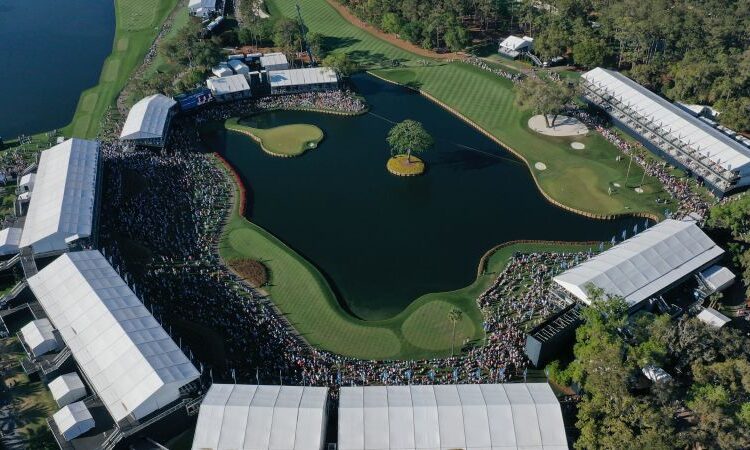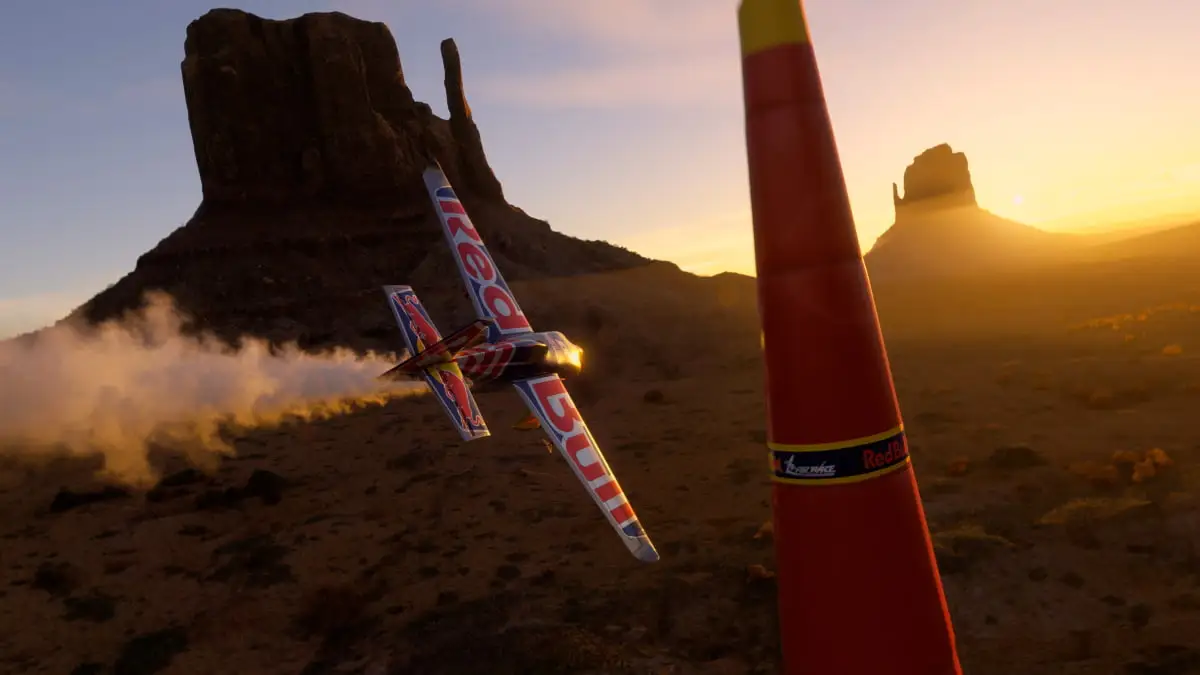Jack Nicklaus said players wanted to detonate a bomb under it, while Mark Calcavecchia compared it to a root canal appointment.
Despite measuring a dainty 137 yards from tee to cup, the par-three 17th hole of the Stadium Course at TPC Sawgrass is as feared as it is revered.
An island green encircled by a vast lake on all sides, but for a thin land bridge, the dreams of countless golfers fighting to clinch the PGA Tour’s flagship event – The Players Championship – have sunk into a watery grave alongside their ball.
Since PGA Tour ShotLink tracking began in 2003, 925 balls have splashed into the lake at No. 17 during the tournament. Across the rest of the year, when amateurs take the plunge, up to 120,000 balls are claimed by its waters annually, Sawgrass’ head greenskeeper estimated in 2019.
On the eve of the 50th edition of ‘the fifth major,’ golf’s biggest stars will head to bed knowing even one misstep at the penultimate hole could – at a tournament offering an unrivalled $25 million purse – cost them millions.
Vying for position with legendary par-threes like the 12th at Augusta National or the 7th at Pebble Beach, the 17th at The Stadium Course is undoubtedly among golf’s most iconic holes – and yet its unmistakable style emerged almost inadvertently.
Tasked by then-PGA Tour commissioner Deane Beman with turning flat, wooded North Florida swampland into a unique, spectator-friendly course worthy of the circuit’s premier tournament, course architect Pete Dye had his work cut out when construction began in 1978.
It was a brief that quickly ate into the total build budget of between $7 million and $10 million dollars, then-project manager Vernon Kelly told National Club Golfer last month. A cost-saving solution emerged when it was discovered that the area around the 17th green could be excavated for sand, a valuable resource in shaping the rest of the course and the rolling slopes needed to give fans a good view of action.
Yet the fix created a new set of problems. Dye, who had planned only for a small lake guarding the green, was left to ponder what to do with a now-cavernous pit surrounding the hole.
The answer came from his wife Alice, who proposed they fill the crater with water. In 1982, the course would host The Players Championship for the first time – offering pros their first taste of the island green.
It was a baptism of fire for many of the game’s biggest stars. Golf’s ‘Big Three’ – Jack Nicklaus, Arnold Palmer and Gary Player – all missed the cut as Jerry Pate clinched a two-shot victory before launching Beman, Dye, and then himself into the waters of the 18th hole in celebration.
It didn’t take long for the 17th hole to build an infamous reputation.
In 1987, Jeff Sluman – locked in a sudden-death playoff with American compatriot Sandy Lyle – stood over a putt on the island green knowing a conversion from inside six feet would seal him his first PGA Tour title and $182,000.
It was at that moment college student Hal Valdes dove into the lake and began paddling. Sluman backed off, and after a soaked Valdes was led away a minute later, he watched his putt come up agonizingly short. Lyle would take the championship on the subsequent hole.
“It sure didn’t help me,” Sluman told reporters after. In a 2022 interview with Golf Digest, Valdes revealed his interruption was the result of a $500 dare from a friend.
Yet Valdes is arguably not the hole’s most famous intruder. That title may well belong to one seagull who, in 1998, swooped down to pluck Brad Fabel’s ball from the green before taking flight and dropping it into the water.
Fabel, who had sunk the very first 17th hole ace in Players Championship history in 1986, was permitted to put a new ball down where his former one had been, only to three-putt and leave with bogey.
The island green would take center stage again at the tournament’s climax, as Florida-local Len Mattiace arrived at the 71st hole one shot off the lead as he chased a first PGA Tour crown. As his mother watched on from behind the ropes, the surrounding crowd watched in horror as Mattiace plopped one, then two, shots into the water.
Finally leaving with a quintuple-bogey eight, Mattiace would slide to tied-fifth, four strokes behind champion Justin Leonard.
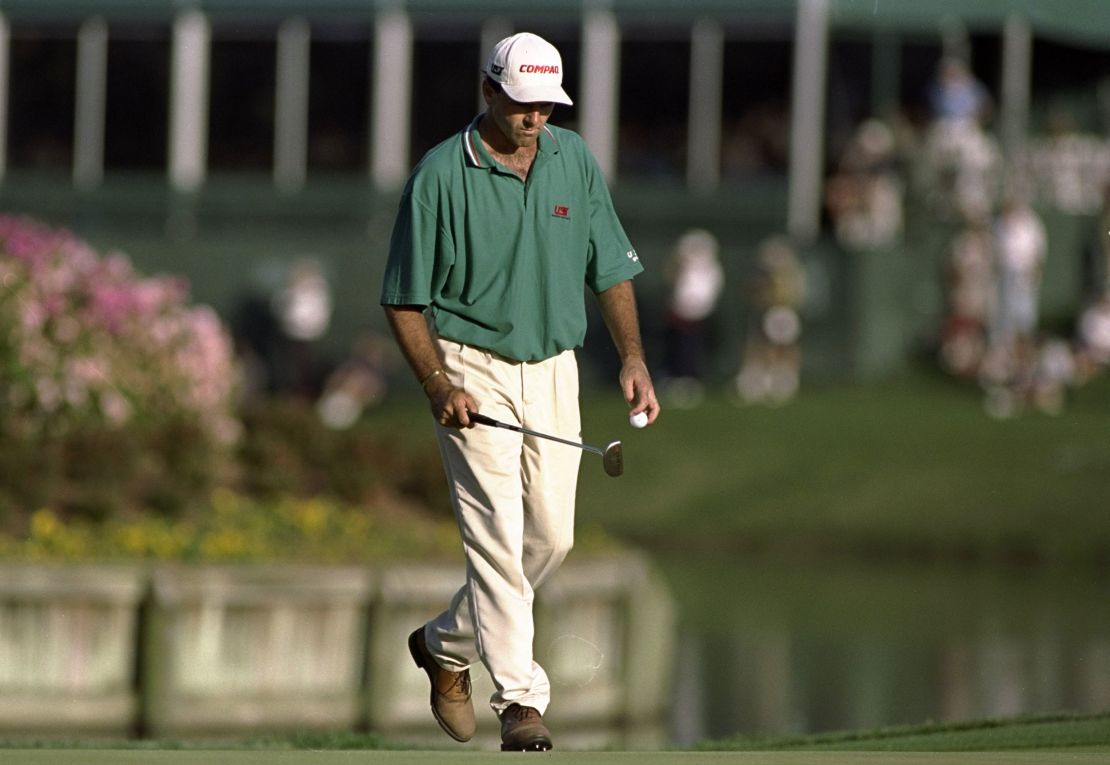
More horror stories would follow. Sergio García had arrived at the penultimate hole tied for the lead with Tiger Woods in 2013, only to join Mattiace in finding the lake twice. Woods, who rarely needed any extra help to win, duly clinched his second Players title.
It was a cruel twist of fate for the Spaniard, who had won the tournament five years earlier after his playoff opponent Paul Goydos had struck into the water.
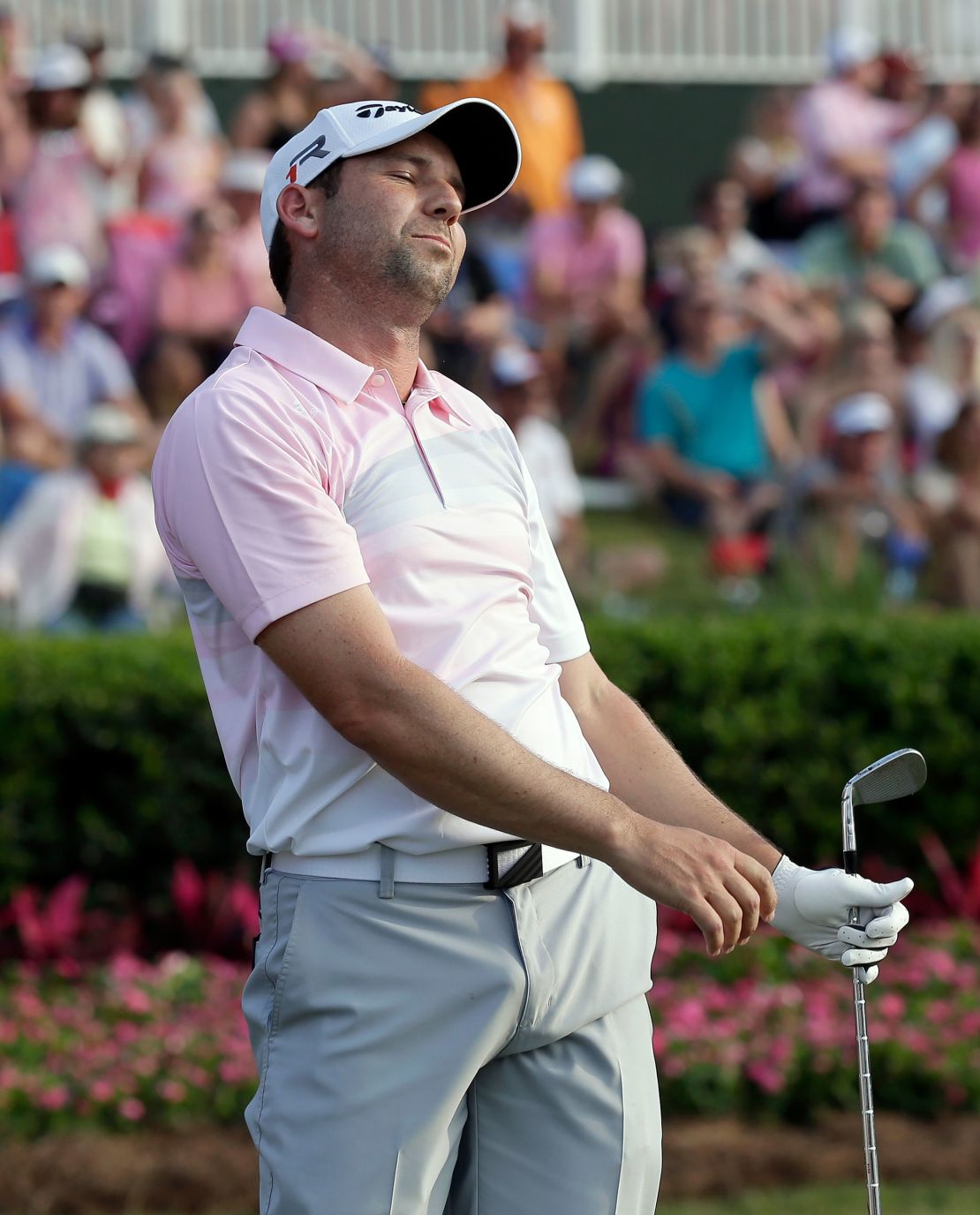
While it may not have cost Bob Tway the 2005 tournament, the American suffered the ignominy of posting the highest score ever carded on the 17th hole. Tway splashed four balls into the water before finally holing out with his 12th stroke, taking the existing unwanted record away from Robert Gamez, who shot 11 in 1990.
Between 2003 and 2022, an average of 48.68 balls per tournament have found the lake. An eye-watering 50 balls went into the water during a wind-swept first round in 2007, contributing to a tournament-record high of 93 – dwarfing the low-record of 28 from 2014.
It’s not all been doom and gloom though.
Alex Smalley’s hole-in-one during the final round of last year’s tournament saw him join an elite group of 13 players to have made an ace on No. 17. After Hayden Buckley and Aaron Rai had achieved the feat earlier in the week, it marked the most hole-in-ones made at a Players event – after just three had been seen across over 7,400 tee shots between 2000 and 2016.
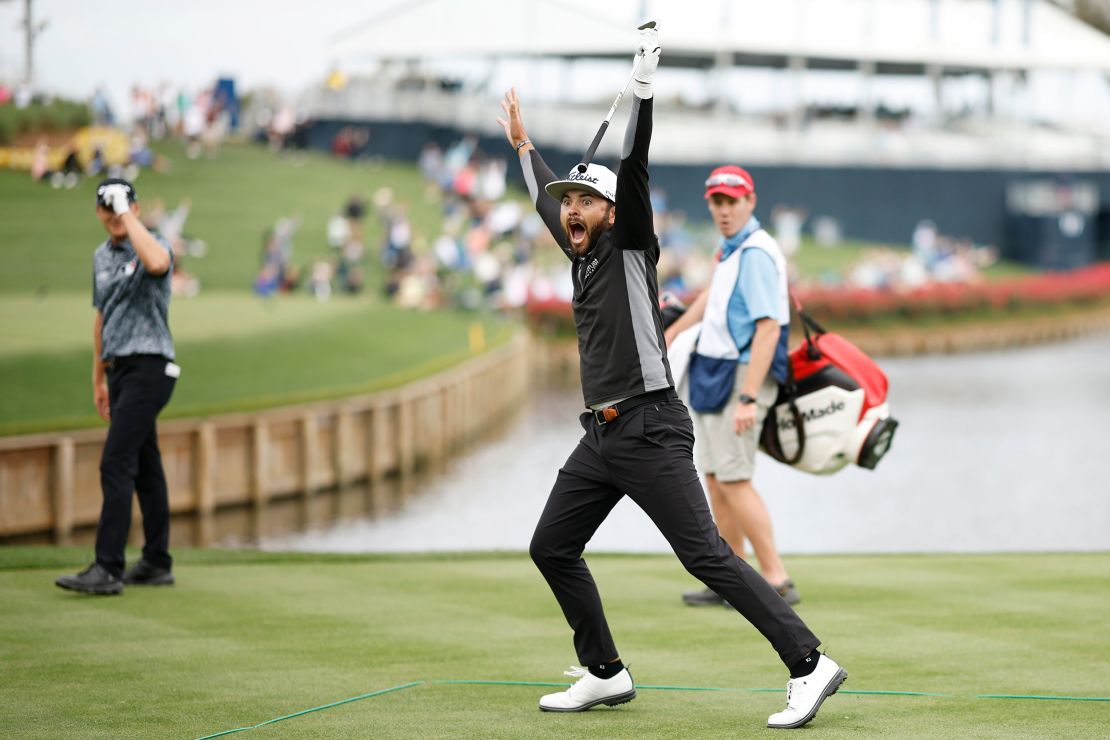
The third ever ace was technically a ‘hole-in-three.’ In 1997, Fred Couples shrugged off the despair of finding the water with his tee shot by slam-dunking his subsequent effort into the cup for surely the most bizarre par of his career.
Rickie Fowler has yet to ace the 17th, but emphatically put his stamp on the hole’s history in 2015 when he birdied it five times from six attempts – including three on the Sunday – on course to his biggest career victory in 2015. The American birdied No. 17 twice during a three-way playoff to see off Kevin Kisner and García.
Matt Kuchar staked his claim for the greatest non-hole-in-one shot ever played on the hole in 2015 when, fighting to make the cut at the end of the second round, he lined up an awkward looking lie next to a bulkhead.
Unable to swing right-handed due to his proximity to the water, Kuchar turned to face the opposite direction and scooped a stunning one-handed shot onto the green. However, a subsequent two-putt bogey would see him fail to make the weekend.
Yet for many golf fans, there’s no debate as to the iconic shot holed at the 17th – after all, it was “better than most.”
A blistering third round had seen Woods race into contention as he chased his first Players title at the 2001 tournament, yet an over-hit shot at the second-to-last hole looked set to puncture his momentum.
Some 60-feet away from the cup at the back of the green, Woods sent a winding effort meandering across the grass. Stone-faced, Woods raised his putter in anticipation as NBC commentator Gary Koch repeated his now-immortalized call: “Better than most.”
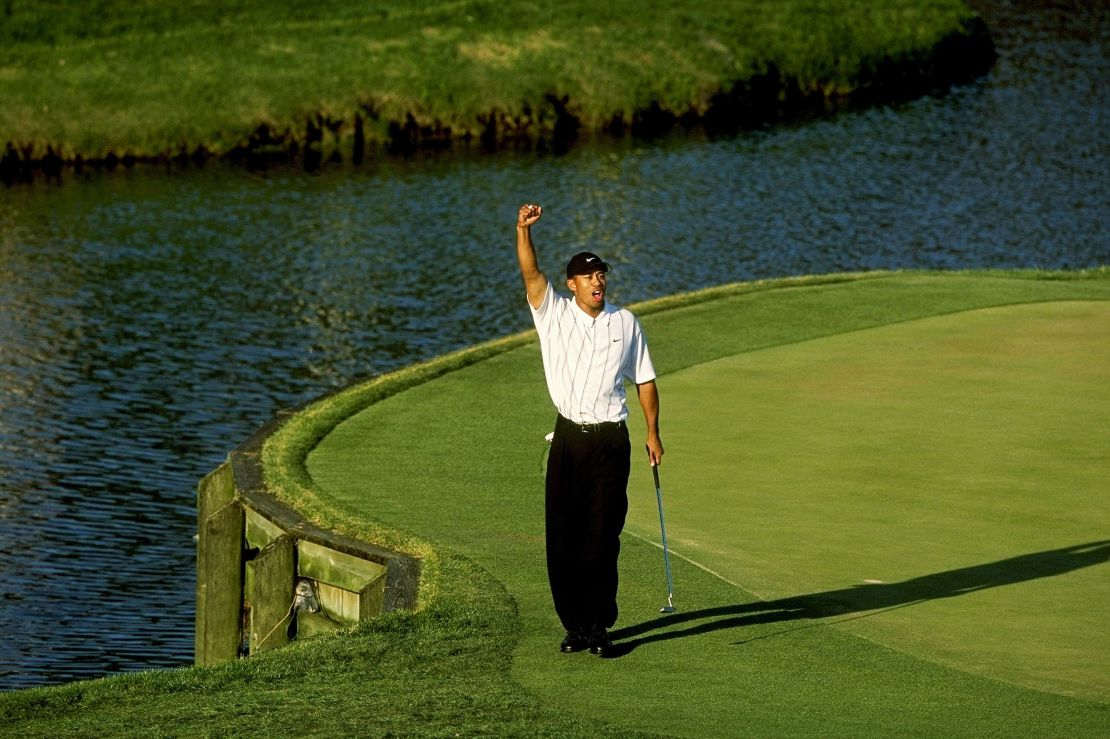
The birdie would prove crucial as Woods went on to clinch the trophy by a single stroke ahead of Vijay Singh.
Though brilliant shots have been a hallmark of the 15-time major champion’s career since, that putt, his emphatic celebration and Koch’s call remain one of Woods’ defining moments.
Read the full article here











